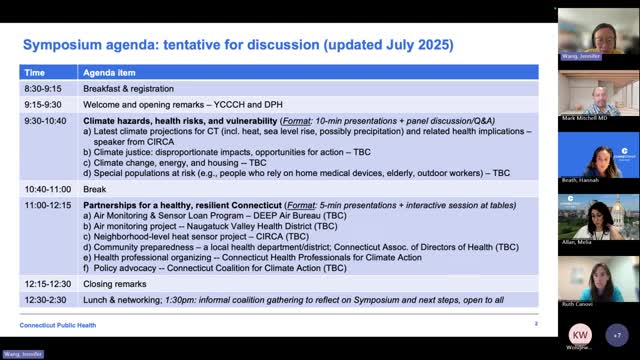Connecticut Discusses Overdose Risks Linked to Extreme Heat and Substance Use
July 18, 2025 | Department of Public Health, Departments and Agencies, Organizations, Executive, Connecticut
This article was created by AI summarizing key points discussed. AI makes mistakes, so for full details and context, please refer to the video of the full meeting. Please report any errors so we can fix them. Report an error »

Extreme heat's impact on health took center stage at the BRACE Climate and Health Equity Coalition Quarterly Meeting, held on July 16, 2025, in Connecticut. The discussion highlighted the alarming connection between rising temperatures and increased overdose incidents, particularly among substance users.
Christine, a key speaker, emphasized the need for awareness regarding how extreme heat affects the body’s response to drugs. She noted that during hotter conditions, individuals are more likely to overdose rather than simply experience the effects of their substances. This critical insight underscores the urgent need for targeted interventions, especially in areas like New Haven and Greater Hartford, which are recipients of a federal CDC grant aimed at addressing overdose issues.
Participants at the meeting expressed a desire for collaboration with local harm reduction services, suggesting that representatives from the Connecticut Harm Reduction Alliance could provide valuable insights into the intersection of substance use and extreme heat. The conversation also touched on the importance of making health discussions accessible to the public and environmental justice groups, ensuring that the information reaches those most affected.
As the coalition moves forward, the focus will remain on addressing health risks associated with climate change, particularly for vulnerable populations. The anticipated outcomes include increased public awareness and the development of strategies to mitigate the health impacts of extreme heat, particularly in relation to substance use.
Christine, a key speaker, emphasized the need for awareness regarding how extreme heat affects the body’s response to drugs. She noted that during hotter conditions, individuals are more likely to overdose rather than simply experience the effects of their substances. This critical insight underscores the urgent need for targeted interventions, especially in areas like New Haven and Greater Hartford, which are recipients of a federal CDC grant aimed at addressing overdose issues.
Participants at the meeting expressed a desire for collaboration with local harm reduction services, suggesting that representatives from the Connecticut Harm Reduction Alliance could provide valuable insights into the intersection of substance use and extreme heat. The conversation also touched on the importance of making health discussions accessible to the public and environmental justice groups, ensuring that the information reaches those most affected.
As the coalition moves forward, the focus will remain on addressing health risks associated with climate change, particularly for vulnerable populations. The anticipated outcomes include increased public awareness and the development of strategies to mitigate the health impacts of extreme heat, particularly in relation to substance use.
View full meeting
This article is based on a recent meeting—watch the full video and explore the complete transcript for deeper insights into the discussion.
View full meeting
